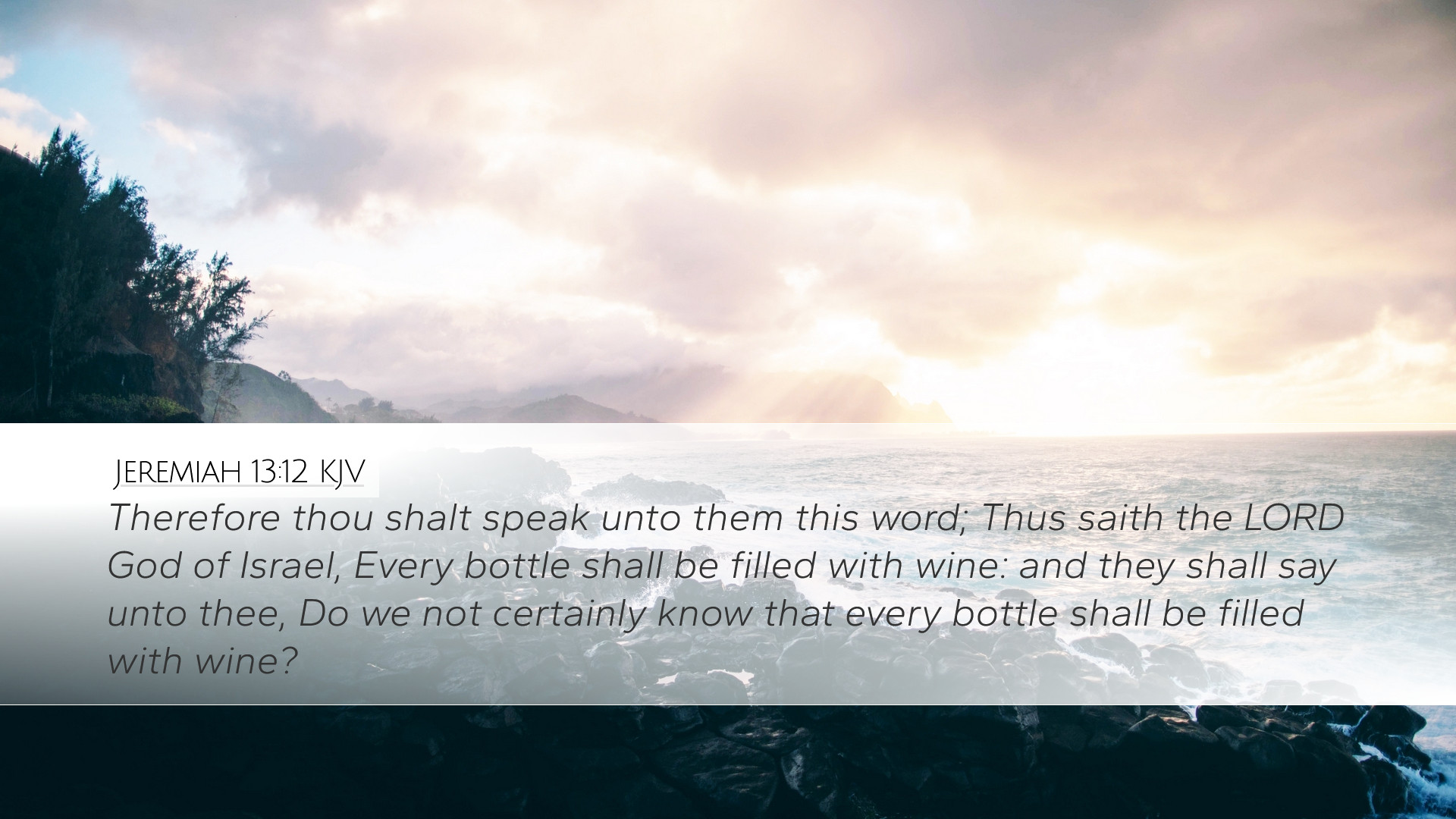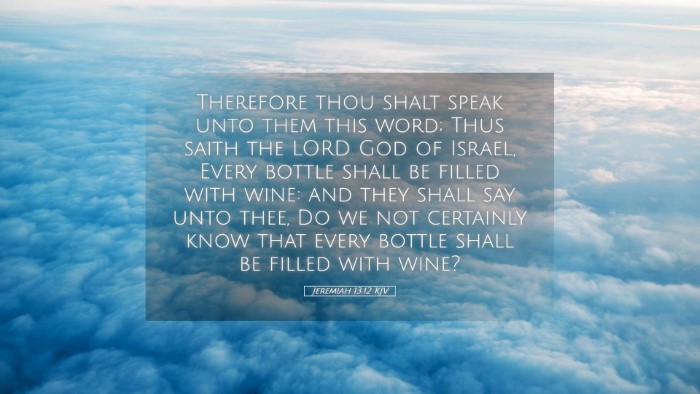Commentary on Jeremiah 13:12
Jeremiah 13:12 states: "Therefore you shall speak to them this word: 'Thus says the Lord God of Israel: Every jar shall be filled with wine.' And they will say to you, 'But we know that every jar shall be filled with wine.'" (ESV)
This verse is part of a prophetic message addressing the people of Judah and their stubbornness regarding God’s warnings. It serves both as a metaphor for God’s judgment and a reflection of the people's disobedience and misunderstanding of divine prophecy.
Contextual Overview
Understanding the context is crucial to interpreting Jeremiah 13:12. Jeremiah prophesied during a tumultuous time in Judah. The nation was grappling with impending judgment due to covenantal unfaithfulness, and the image of filled jars serves as both a promise of God’s presence and a warning of the coming destruction.
Insights from Matthew Henry
Matthew Henry elaborates on the significance of the jars in Jeremiah 13:12. He views the jars as symbols of the people of Israel, who, like the jars, have been prepared to receive God’s Word, yet they are filled with wickedness instead of righteousness. Henry emphasizes that God’s words are always meant to awaken, teach, and reform. However, the habitual disobedience of the people makes them unaware of their spiritual condition.
- Symbolism of the Jars: Henry notes that each jar represents the potential for receiving the goodness that God offers, yet they are often filled with sinful desires instead of His blessings.
- Stubbornness of the People: The response of the people, “But we know that every jar shall be filled with wine,” reflects their disbelief in God’s warning. Henry suggests that this complacency stems from a deep-seated resistance to change.
- God’s Patience: Despite their unresponsiveness, Henry points out that God continues to communicate with His people, demonstrating His desire for their repentance and restoration.
Reflections from Adam Clarke
Adam Clarke offers a comprehensive interpretation of this verse by placing it within the cultural context of ancient Israel. He notes that wine was a common symbol of joy but also of judgment and chaos when misused. Clarke insists that the phrase “every jar shall be filled with wine” conjures images of both blessing and curse depending on how the people respond to God's commands.
- Wine as a Symbol: Clarke points out that while wine is often viewed positively, in this context, it can also indicate the intoxicating effects of sin which leads to moral and spiritual downfall.
- Call to Awareness: Clarke underscores that God's intention behind the message is to provoke thought among the people, urging them to realize that they are filled not with God's blessings, but with their own iniquities.
- Divine Foreknowledge: Clarke highlights that God, in His omniscience, foresees the people's responses. He uses this knowledge to convey the depths of human rebellion and the need for repentance.
Albert Barnes' Commentary
Albert Barnes offers a practical application of Jeremiah 13:12 regarding the nature of prophecy. He insists that prophecy is not merely a foretelling of future events but also an urgent call to action. Barnes explains that the jars symbolize the hearts of the people, emphasizing the necessity for them to be filled with righteousness rather than sin.
- Prophecies of Judgment and Hope: Barnes interprets the filled jars as an indication of both impending judgment and the hope for renewal that God offers to those willing to heed His voice.
- Spiritual Nutrients: The content with which the jars are filled can be seen as the spiritual resources available to individuals. Barnes encourages believers to fill their lives not with fleeting pleasures but with spiritual truths and godly character.
- Challenge of Complacency: He warns against the danger of becoming complacent or dismissive of divine warnings, which can lead to spiritual lethargy and separation from God.
Theological Insights
The theological implications of Jeremiah 13:12 are profound. At its core, this verse brings to light the relationship between human agency and divine sovereignty. The people's filled jars symbolize their choices and the subsequent consequences of those choices in light of God’s covenant.
- Human Agency: The assertion that they “will say” reflects an understanding of free will. God’s warnings demand a response, and a refusal to engage with these warnings results in dire consequences.
- Divine Sovereignty: The proclamation that “every jar shall be filled” expresses God’s power over Israel – that He commands the fate of nations and individuals alike. It underscores His role as both Creator and Judge.
- Invitation to Repentance: Ultimately, this verse serves as an invitation for self-examination and repentance. It encourages leaders, theologians, and believers to introspect their spiritual condition and be filled anew with God's grace.
Conclusion
Jeremiah 13:12 encapsulates the struggle between divine calling and human resistance—a reminder of the need for spiritual vigilance and responsive faith. The insights from public domain commentaries illuminate the richness of this verse, encouraging scholars, pastors, and students alike to delve deeply into their spiritual formation.
As we reflect on the emphatic nature of this prophetic utterance, may we be challenged to examine what fills our own jars and strive for a life characterized by obedience, holiness, and deep communion with God.


